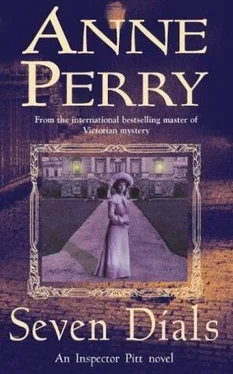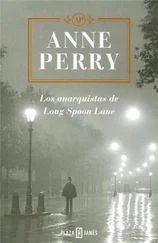Arnold Yeats was dead. It had happened less than four years after he left Egypt. He had been posted to India, his health apparently completely recovered. He was a talented officer remarkable for his extraordinary courage. He seemed to know no fear, and his men saw him as a hero they would follow anywhere.
“Brave,” the officer said, looking at Pitt with pain in his eyes. “Even reckless. Took one risk too many. Decorated posthumously. Too bad… we can’t afford to lose men like that.”
“Reckless, you said?” Pitt questioned.
The officer’s face tightened and something inside him closed. “Wrong word,” he said tartly, and Pitt could not draw him to say anything further. He thanked him and left.
So of the four friends in Alexandria two were dead, one on the field of battle, one murdered, one was apparently missing, and the fourth was a priest in Seven Dials who had been stunned with horror at the mention of Martin Garvie’s name.
He turned on his heel and walked straight to the curb, then out into the first couple of yards of the street, his arm waving to attract the next hansom that passed.
The Old Bailey was crowded with people, pressing forward, calling out to each other, complaining and jostling for a place. With difficulty, Pitt elbowed his way towards the front and finally was stopped by a constable who placed himself squarely in his path.
“Sorry, sir. Can’t go in there. If you wanted a seat you should’ve come sooner. First come, first in, that’s the rule. Fair enough?”
Pitt drew in his breath to argue, and realized it was pointless. He had no authority to show that would allow him preference. To the constable he would seem to be just another curious spectator, come to watch the fall of a powerful man and gaze at an exotic woman accused of murder. And there were certainly enough of them. He was pressed from behind, his feet trodden on, his back bumped and poked. The constable was keeping his temper with difficulty, his face overpink and gleaming with sweat.
“I’ll wait out here,” Pitt said.
“In’t no use, sir. There isn’t going to be no room in there today.” The constable shook his head, indicating the courtroom.
“I need to speak to someone who is inside,” Pitt replied.
The constable looked disbelieving, but he said nothing.
Pitt went past the court where Ryerson and Ayesha Zakhari were being tried, and stood impatiently in the hallway outside the next one along.
It was an hour before anyone emerged, and he had begun to wonder if he was wasting his time. Perhaps Narraway was not in there anyway. Yet the compulsion remained to wait until the adjournment and watch every person who emerged. Finally the doors opened and a small, thin man with brown hair came out. He looked left and right, then took a step forward. Pitt approached him. “Excuse me. You were in the Ryerson trial.” It was more a statement than a question, but the words were out before he considered them.
“Yes,” the man agreed. “But it’s packed in there. You won’t get in.”
“What has happened so far?”
The man shrugged. “Only what you’d expect, a lot of police saying what they found. She did it, of course; the only mystery is how she thought she’d get away with it.”
Pitt glanced around him at the people still waiting hopefully, as if there was yet some chance of drama in which they could share.
“It could bring the government down in time,” the man said, as if in answer to the question Pitt had only thought. “Narrow majority-important minister mixed up with a woman like that. Trouble up Manchester way.” He pulled his mouth into a slight sneer. “I thought it would have been more interesting. Defense lawyer’s got nothing. I might come back tomorrow.” And without waiting he pushed past and disappeared into the crowd.
Pitt moved closer to the door so he would have a better chance to see Narraway, if indeed he was inside.
As it was, he very nearly missed him and only caught up as Narraway moved across the hall towards the steps to leave. He looked at Pitt with momentary irritation, thinking he had been bumped into by a stranger, then he recognized him and his face sharpened with attention. “Well?” he demanded.
“What happened in there?” Pitt countered.
Narraway stopped and faced Pitt, his eyes wide. “You came here to ask me that?”
There was a dangerous edge to his voice, and Pitt saw the lines of strain etched deep into his face. He was holding control of himself with an effort. They had failed to help Ryerson, and again Pitt was reminded sharply that for some reason deeper than anything he understood, it mattered intensely to Narraway. Was it simply failure that hurt him, or was there a personal wound to do with events, feelings in the past of which Pitt was ignorant?
Narraway was waiting.
“I came to tell you that Arnold Yeats is dead,” Pitt replied. “He was the fourth soldier of the group of Lovat’s friends. Lovat was murdered, Garrick is missing, and Sandeman has become an obscure priest in the back alleys of Seven Dials.”
Narraway stood quite stiff. “Indeed? And how do you know this?”
“I asked the War Office!” It was the obvious answer. Then he realized that Narraway was referring not to Yeats but to Garrick and Sandeman.
“Keep your wife out of it, Pitt,” Narraway said in a low, careful voice, his face pinched. He ignored the flash of responding anger in Pitt’s eyes. “She is the only one who has connected Lovat, Garrick, and Sandeman, so far as I know. And I still have no idea what we are dealing with.” He reached out and took Pitt by the elbow, his fingers gripping hard, pulling him out of the melee towards a doorway to the side.
“It’s going badly?” Pitt said. It was barely a question.
Narraway leaned against the door arch, but his body was rigid; there was no grace in it. He looked too tense to remain in any position long. “They are not here to see proof of guilt or innocence,” he replied bitterly. “They take the guilt for granted, and I think the jury probably does as well. It is about whether the government can survive the scandal. It is the same instinct which makes people go stag hunting, or shooting wild animals-the spectacle of seeing something with more grace and power than themselves dragged down. They haven’t the ability to create, only to destroy, and that is more intoxicating than nothing at all.”
Pitt looked at the anger and helplessness in Narraway’s face, and again was almost submerged in his emotion. “Are you saying it is political by accident or by design?” he asked.
Anger filled Narraway’s eyes, then disappeared. “I don’t know!” he said with a note of desperation.
“I don’t believe Ayesha Zakhari is guilty of the stupid murder of a man she no longer knew or cared about,” Pitt said miserably.
“And if her intention was to bring Ryerson down, in whatever way she could?” Narraway asked, his black eyes hard and angry.
“She came as an idealist, believing she could improve her country’s economic independence,” Pitt said with complete conviction. “That is not so unrealistic.”
“I am as familiar with Egyptian economic history as you are!” Narraway snapped. “And it was the expansion under Said Pasha, then Khedive Ismail, and the return of American cotton after their civil war, which crippled them and forced Ismail to abdicate in ’79 and opened the way for us to take the control we now have. If Ayesha Zakhari is as well-educated as you say, surely she must have known that even better than we do.”
Pitt had no answer. They were caught in a morass of facts which made no coherent story, except one of impulse and stupidity, and that was not what he wanted to believe.
“You had better follow it,” Narraway said quietly, already half turning away, almost as if he did not wish Pitt to see any hope in his face. “Be in my office at seven in the morning,” he ordered. “Day after tomorrow.” And he walked away, leaving Pitt alone.
Читать дальше












